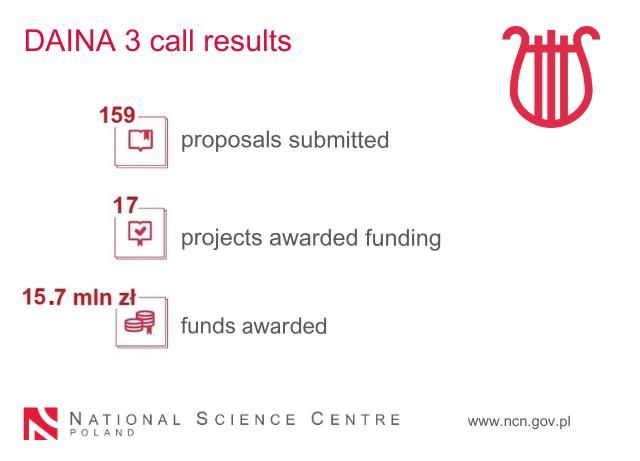17 Polish and Lithuanian research projects were recommended for funding under DAINA 3. The Polish research teams will be awarded over 15 million zlotys for their research.
DAINA 3 was addressed to Polish research teams intending to carry out
 basic research projects in tandem with their partners from Lithuania. The call was open to researchers in all research domains covered by the NCN review panel. The National Science Centre provides funding for Polish research teams, while the Research Council of Lithuania will fund research teams from Lithuania pursuant to an agreement concluded by the two institutions in 2016.
basic research projects in tandem with their partners from Lithuania. The call was open to researchers in all research domains covered by the NCN review panel. The National Science Centre provides funding for Polish research teams, while the Research Council of Lithuania will fund research teams from Lithuania pursuant to an agreement concluded by the two institutions in 2016.
The principal investigator in the Polish research team must be at least a PhD holder with at least one paper published or accepted for publication or at least one artistic achievement or achievement in research in art over the past 10 years. DAINA projects can be carried out over the period of 3 years. The project budget may cover remuneration of the research team members, scholarships for students or PhD students, purchase or manufacturing of research equipment and for other costs necessary to complete the Polish part of the research project.
The National Science Centre received 159 proposals under DAINA 3. Proposals were evaluated by the Expert Team established by the NCN Council during a peer review performed in two stages. 17 proposals were awarded funding, including 5 in Arts, Humanities and Social Sciences (HS), 7 in Physical Sciences and Engineering (ST) and 5 in Life Sciences (NZ). The total value of work covered by the project proposals of the Polish research teams is nearly 15.69 million zlotys.
Studies of winning applicants under DAINA 3
The winning projects in Arts, Humanities and Social Sciences include the project “Polish and Lithuanian Music in Global Perspective: Migration, Diasporic Identities and Homeland” headed by Dr hab. Beata Bolesławska-Lewandowska from the Institute of Polish Art of the Polish Academy of Sciences. The Polish research team will research the migration processes in the 20th century Polish and Lithuanian music cultures together with the research team from the Lithuanian Academy of Music and Theatre in Vilnius. The researchers will apply transnational approach to contribute to a shift in national music history writing as a history of global migratory movements, interconnections, and networks.
One of the winning projects in Life Sciences will be headed by Dr inż. Krzysztof Noworyt from the Institute of Physical Chemistry of the Polish Academy of Sciences, whose team will pursue the project “Analytical methods for the determination of contaminants in dairy products using electrochemical multisensors platform with molecularly imprinted polymer recognition films.” His research will be conducted in cooperation with researchers from the Lithuanian State Research Institute – Centre for Physical Sciences and Technology FTMC in Vilnius. Researchers will work on the development of fast, cheap, and reliable analytical methods for rapid food analyses allowing to discover for undesired contaminants that can appear during food production, such as growth-promoting hormones, antibiotics or other medication.
The winning projects in Physical Sciences and Engineering include a project headed by Prof. Dr hab. Łukasz Wyrzykowski from the University of Warsaw, whose team will pursue the project “Polish-Lithuanian Black Hole Hunt - harvest time.” Researchers from the University of Warsaw, in tandem with their colleagues from the Vilnius University, will study objects identified as potential black holes by the Gaia space mission that has been scanning the entire sky with unprecedented precision since 2014. Starting in 2025, its data will be available to members of the Gaia Collaboration, including the Polish project team headed by Prof. Wyrzykowski. Researchers from Poland and Lithuania will also use the data collected under the previous DAINA project and on new ones acquired with a global network of telescopes.
DAINA is a result of NCN’s cooperation with the Research Council of Lithuania. 26 Polish and Lithuanian research projects have been completed owing to funding awarded under the last two calls. Researchers from Poland together with their Lithuanian partners have studied, inter alia, the impact of plastic waste on Arctic benthic ecosystem changes and perception of bison and primeval forest in the 18th and 19th century.
